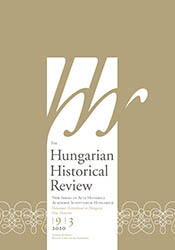Impoverished by Cholera: Widows, Widowers, and Orphans after the 1873 Cholera Epidemic in Kolozsvár
Impoverished by Cholera: Widows, Widowers, and Orphans after the 1873 Cholera Epidemic in Kolozsvár
Author(s): Edina Tünde GálSubject(s): 19th Century
Published by: Magyar Tudományos Akadémia Bölcsészettudományi Kutatóközpont Történettudományi Intézet
Keywords: cholera epidemic; orphans; poverty; widows; remarriage
Summary/Abstract: By analyzing the official sources produced during the communal management of a crisis due to the cholera epidemic, the study focuses on the official definitions of people in need of support as well as the survival strategies of ordinary widows and orphans in the city of Cluj-Napoca/Kolozsvár in the second half of the nineteenth century. Widows with children were more likely to be considered disadvantaged and receive aid than widowers. Poverty was closely related to a given individual’s ability or inability to work. Remarried widows were not considered eligible for aid, regardless of the family’s financial resources. The presence of small children was a strong motivating factor for remarriage: widows hoped to get financial support from a new spouse, while widowers needed a wife to care for children. The term orphan often referred not to the family position of a child, but rather to its place within the larger social network.
Journal: The Hungarian historical review : new series of Acta Historica Academiae Scientiarum Hungaricae
- Issue Year: 9/2020
- Issue No: 4
- Page Range: 667-692
- Page Count: 26
- Language: English

